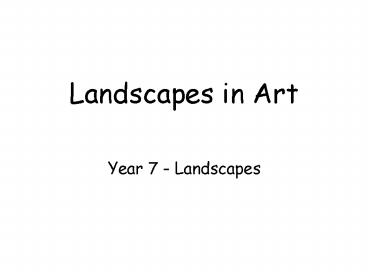Landscapes in Art - PowerPoint PPT Presentation
1 / 25
Title:
Landscapes in Art
Description:
... is flanked on the left by the Garden of Eden and on the right by Hell. ... Barbara Rae drove up into the hills in Scotland, where there was a landscape of ... – PowerPoint PPT presentation
Number of Views:1128
Avg rating:3.0/5.0
Title: Landscapes in Art
1
Landscapes in Art
- Year 7 - Landscapes
2
Landscapes
- Landscapes are pictures that show a glimpse or a
snapshot of the environment. - Landscapes have been painted by many different
artists throughout history. - Landscape pictures often create a mood or feeling
about a particular place.
3
Aims of the lesson
- You are going to see the development of landscape
painting over the last 500 years. - You will look closely at the different ways in
which the artists approach the landscape. - You will be more able to consider your own
composition for a painting.
4
The Annunciation by Sandro Botticelli
5
Sandro Botticelli
- Botticelli 1445-1510 was an Italian Renaissance
artist. - The Renaissance was a time of rediscovery of
ancient Greek and Roman ideas and artistry.
6
The Garden of Earthly Delights, by Hieronymous
Bosch 1450-1516
7
Hieronymous Bosch
- Hieronymous Bosch, 1450-1516 produced some of the
most inventive fantasy paintings that have ever
existed. - The Garden of Earthly Delights demonstrates
Bosch's dazzling ability to build up a hugely
detailed landscape through a series of bizarre
exaggerations and distortions. - The complete work consists of four paintings on a
series of folding panels the outer panel reveals
the Third Day of Creation when closed. Inside,
The Garden of Earthly Delights is flanked on the
left by the Garden of Eden and on the right by
Hell.
8
Landscape with Orpheus and Eurydice by Nicolas
Poussin 1650-1
9
Glebe Farm by John Constable
10
John Constable
- John Constable, 1776- 1837
- He entered the art world fairly late in life.
Born at East Bergholt, Suffolk, the son of a
prosperous corn merchant, John Constable spent
several years in the family business before
deciding, and obtaining permission, to study
painting full-time. - He is well known for painting scenes not far from
where he lived.
11
Norham Abbey by JMW Turner
12
JMW Turner
- Turner, (1775-1851) was a keen painter of
landscapes. - He used watercolour and oil paint to create his
carefully chosen scenes. - His work can been seen in the Tate Gallery,
London.
13
Olive Trees with Yellow Sky and Sun, 1889 by
Vincent van Gogh
14
Vincent van Gogh
- Vincent van Gogh was born near Brabant, the son
of a minister. In 1869, he got a position at the
art dealers, Goupil and Co. - He was largely self-taught as an artist, although
he received help from his cousin, Mauve. - In Paris he discovered colour which helped to
create the distinctive dashed brushstrokes of his
later work.
15
Lost Mine, 1959 by Peter Lanyon
16
Peter Lanyon
- Peter Lanyon, 1918-1964
- Lost Mine 1959
- Typically for Lanyon's work, Lost Mine refers to
a tin mine that was consumed by the sea in a
storm and abandoned. - Colour is used symbolically.The black represents
the mine shaft and signifies death, the blues are
the sea and sky,the red signals life and danger.
17
Red and Orange Hills, 1938-39 by Georgia O'Keeffe
18
Georgia O'Keeffe
- Georgia O'Keeffe 1887-1986
- "...I often painted fragments of things because
it seemed to make my statement as well as or
better than the whole could...I had to create an
equivalent for what I felt about what I was
looking at...not copy it."
19
Vegetable Fields, 1911 by August Macke
20
August Macke
21
Yellow Field, Lammermuir by Barbara Rae
22
- Barbara Rae
- One characteristic of great landscape painting is
that it can be both general and particular of
significance to everyone or of a particular
place. - Barbara Rae drove up into the hills in Scotland,
where there was a landscape of burnt heather,
ancient fields and even older buildings.
23
(No Transcript)
24
Time line
25
Plenary
- Can you recognise the development of landscape
painting over the last 500 years? - Can you understand the different ways in which
the artists approach the landscape? - Are you more able to consider your own
composition for a painting?































